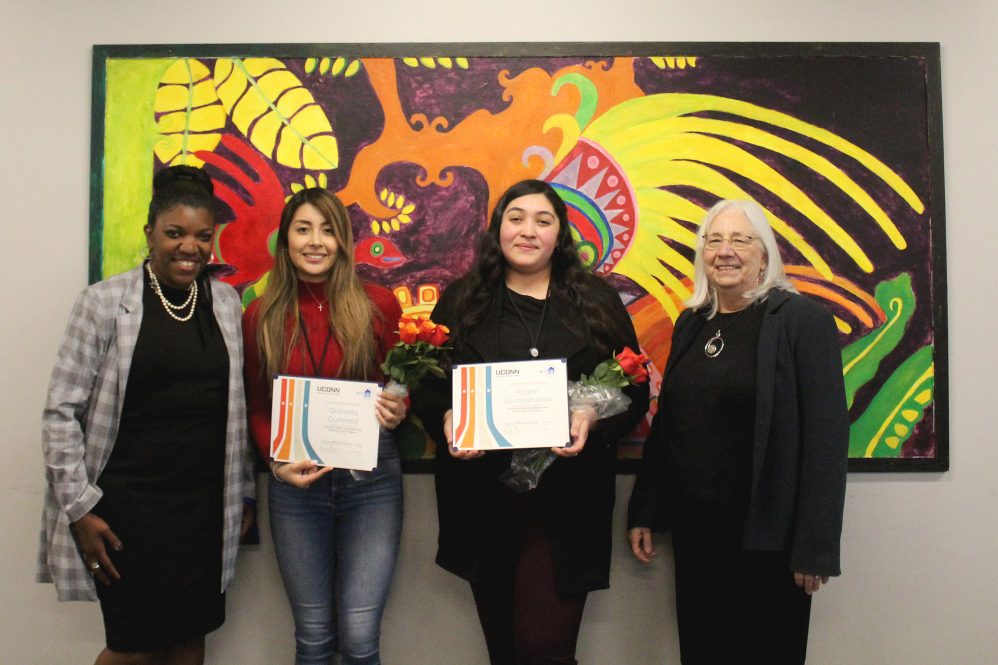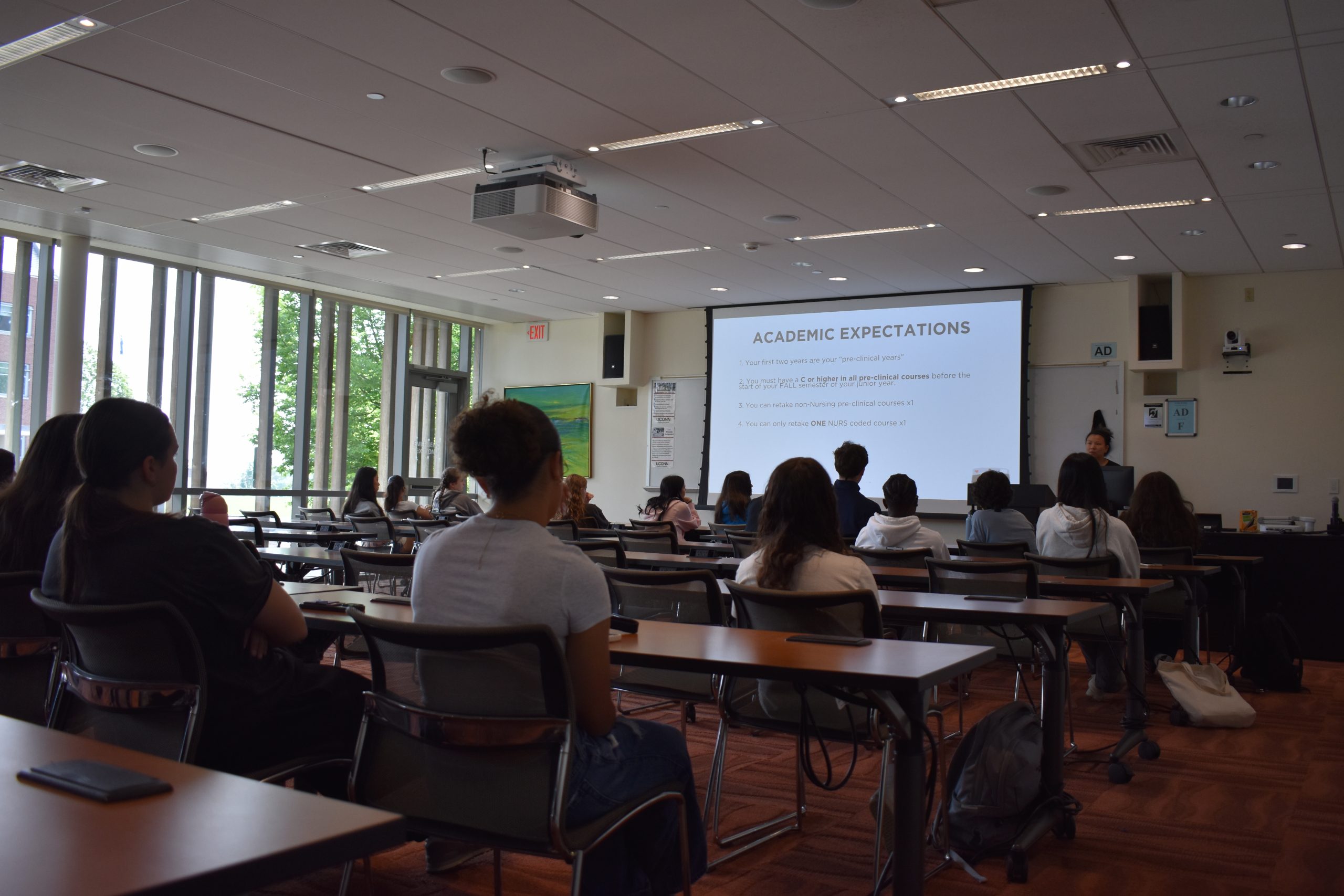When Gianella Gutierrez, BSW 22, was applying for UConn’s Bachelor of Social Work degree program and deciding on her major, she thought about her aunt. Her older relative had been a foster parent who eventually adopted four children. Gianella was familiar with the experience of having a social worker from the Department of Children and Families (DCF) come to her aunt’s home to offer case management.

“I remember my aunt only spoke Spanish and she had difficulty talking to the social worker because not all of them speak the language,” she says. When Gianella learned about the opportunity to pursue her social work studies with a Spanish-speaking Child Welfare and Protection track, she decided to do it for the experience and to support the Latinx/a/o community.
Launched in 2020, the BSW track is the latest program to come out of a longstanding partnership between the School of Social Work and DCF. Its purpose is to prepare entry-level social workers to serve a growing number of Spanish-speaking Latinx/a/o families in child welfare and protection. This spring, the first two students in the track will graduate, with three more in the pipeline to start in the fall 2022.
The client need and alignment with the University’s priority of supporting Connecticut’s changing workforce are clear. “In my discussions with state agency commissioners and CEOs of many local social service agencies, there is a consensus about the significant lack of Spanish-speaking social workers in their agencies,” says Nina Rovinelli Heller, dean of the School of Social Work. “With the increased focus on the significant mental health challenges facing children and adolescents and their families in the aftermath of the pandemic, the need for bilingual social workers is more acute than ever. We want to play a part in addressing this pressing state workforce need.”
To address that need, the program uses experiential learning to prepare social work students for careers at DCF, says Kristine Rivera, LCSW, program supervisor at DCF Academy for Workforce Development. “It encourages bilingual students to practice using the Spanish language to discuss child protection concerns with their supervisor and clients, ultimately enhancing their language skills and future work with children and families,” she notes.
The BSW track curriculum involves 18 hours of educational sessions focused on child welfare and working with Latinx/a/o families. It culminates in a yearlong internship with the state agency.
As part of her studies, Gianella has been working at DCF since the fall. Her experience has confirmed her interest in the Spanish-speaking track. “The Latinx/a/o community can be misunderstood because our culture is different,” she explains. “We’re seen differently in the system.”
Gianella’s ability to communicate with Spanish-speaking families helps to streamline the process of serving those families in the child-welfare agency. When a report comes in to DCF, she is among a team that goes to the home and interviews the family to assess the situation. Without Spanish-speaking interns like herself, the agency would rely on translators who may not understand what the client is trying to communicate or lose details in the translation. But as a fluent Spanish speaker, “I’m right there working with the client one-on-one and getting the information firsthand.”
The Latinx/a/o community can be misunderstood because our culture is different. We’re seen differently in the system. — Gianella Gutierrez BSW ‘22
In one case she saw from beginning to end, Gianella helped a mother of six from Central America address a domestic violence crisis. The client was worried because she is undocumented. “She didn’t want to tell me about her situation at first,” she recalls. “It took time and patience for her to tell me how she came to the United States. I understood why she was in a domestic situation longer than she should have been.”
Another student in the BSW Spanish-speaking track, Virgen “Vivi” Guadarrama BSW ‘22, was drawn to the idea of getting practical experience working with families. “I had heard so much about DCF and when I was told about this program I thought it would be a great opportunity for me, providing me with a variety of experiences at all levels of social work,” she says.
In the classroom, Vivi gained knowledge about DCF, the principles of working in partnership with families, and serving the Latinx/a/o community. During her internship, Vivi has participated in consultations, investigations, and developed case plans for families.
The opportunity to use her language and cultural skills has been a bonus. In one case, Vivi found that while she shared a cultural background with one Puerto Rican family she served, there were important differences. “They embrace the culture differently than I do,” she says. “It’s just an eye-opener as to how you have to be self-aware and understand that you’re there to learn about them and provide services based on their needs.” To address the family’s situation, she thought about the principles of partnership that the Department embraces and viewed the family as experts of their own lives. Through conversation she was able to learn more about their beliefs, family dynamics, and how those impacted their everyday life.
Both students gained practical, real-world skills at DCF as well as affirmation of their cultures. Gianella says her own family migrated to the United States from Peru when she was just 2 years old and her clients’ struggle is reminiscent of her parents’ experience.
“A lot of the clients that I have worked with have been undocumented,” she says. Latinx/a/o parents may be reported for educational neglect, she explains, because they have to work multiple jobs and can’t bring their kids to school or help them with homework at night. “Their issues and why they get into DCF, it’s often because they’re undocumented.”
Regardless of a family’s circumstances, Vivi has been able to utilize language skills she doesn’t use frequently outside of the program. “This has allowed me to bring in my culture, and to practice and embrace the Spanish-speaking side of me and incorporate that in the work of social work,” she says.
Gianella and Vivi both hope to work for DCF, which is one of the goals of the program. Their exposure to a range of client issues complemented their in-class learning and prepared them for the realities of social work. They also look forward to continuing to support the Latinx/a/o community. “I’m hoping to be employed at DCF and continue to be able to connect with Spanish-speaking families and help them in any way shape or form I can,” Vivi says.
“It has been an enlightening experience to witness the growth of Gianella and Vivi while participating in the program,” said Milagros Marrero-Johnson, director of strategic programming for the SSW. “I look forward to the impact they will make with Latino families.”
To learn more and apply to the BSW Child Welfare and Protection track at ssw.uconn.edu/child-welfare-track



